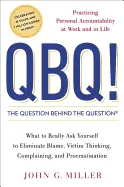
The Question Behind the Question - by John Miller
ISBN: 0399152334Date read: 2022-01-21
How strongly I recommend it: 3/10
(See my list of 430+ books, for more.)
Go to the Amazon page for details and reviews.
A quick little read with one point: We should take full responsiblity. Instead of asking blaming questions like “Why is the service here so terrible?” ask empowering questions like “What can I do?”
my notes
Lousy questions are negative and don’t solve any problems.
They’re also the complete opposite of personal accountability, because in each one the implication is that someone or something else is responsible for the problem or situation.
The answers are in the questions.
If we ask ourselves a better question, we get a better answer.
Guidelines for creating a better question:
1. Begin with “What” or “How” (not “Why,” “When,” or “Who”).
2. Contain an “I” (not “they,” “we,” or “you”).
3. Focus on action.
(“What can I do?” for example.)
Stress is a choice.
Stress is also the result of our choices.
A victim mindset is extremely stressful.
“When will we get the information we need to make a decision?”
“When will they tell us what’s going on?”
When we ask “When?” we’re really saying we have no choice but to wait and put off action until another time.
Questions that begin with “When” lead to procrastination.
Creativity is thinking outside the box?
True creativity is succeeding within the box.
Hitting targets, reaching goals, doing the job well, and making a difference with what we already have.
“When are we going to hear something new?”
The better question to ask is “How can I apply what I’m hearing?”
A poor sailor blames the wind.
A poor coach blames the players.
Personal accountability does not begin with you. It begins with me.
There is no ‘I’ in ‘team’?
I disagree.
No matter the team, there are plenty of I’s, individuals, who can practice personal accountability to help the team move forward.
If everyone is asking, “What can we do?” then nobody is asking, “What can I do?”
Good questions contain an “I,” not “they,” “we,” or “you.”
Questions that contain an “I” turn our focus away from other people and circumstances and put it back on ourselves, where it can do the most good.
We can’t change other people.
We often can’t control circumstances and events.
The only things we have any real control over are our own thoughts and actions.
Ask a group, “What’s the one thing you would change to enhance the effectiveness of your organization?”
Nobody ever says, “Me! I would change me to make our organization run more effectively.”
(But they should.)